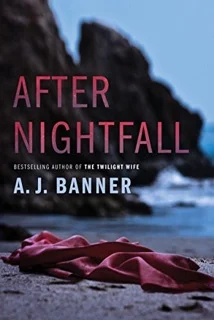After Nightfall: Behind the Book by A.J. Banner
/On a January night in 2001, after a toxic mix of arguments, tranquilizers and alcoholic drinks, the Countess Francesca Vacca Agusta, former model turned millionaire, stumbled out into the garden of her luxurious clifftop villa on the northern coast of Italy—and disappeared. She was wearing only a dressing gown and slippers. Three people were staying with her in the 40-room mansion: her lover, a cook, and a young divorcee. After a few hours, her companions sounded the alarm, and the Carabinieri arrived but found no trace of the countess anywhere on the premises. However, their divers found her ripped dressing gown in the water below the cliff and recovered two mismatched slippers from the nearby rocks. Sadly, a few days later, Countess Agusta’s decomposed body washed up on the French coast nearly 200 miles west of where she had fallen, consistent with ocean currents. Her skull was smashed, she had suffered multiple fractures, and fish had gnawed off her feet. Was her death an accident, suicide or homicide? Eventually, analysis of microscopic particles on the soles of the two mismatched slippers suggested that her death was accidental. But I wonder – without witnesses, video footage or a suicide note, how can anyone ever know for sure?
Buy on Amazon | Barnes and Noble
Maybe the case of Countess Agusta became the idea for my novel, After Nightfall, in which a young woman tries to solve the mystery of her estranged friend’s death from a cliff fall. I say, “maybe,” because I don’t remember when I read about Countess Agusta—before or after the story idea came to me. But the Countess’s strange death stood out in my mind as I revised my manuscript several times, seeking a satisfying ending, focusing on one or another suspect as the likely perpetrator. In later drafts, I broadened the field of suspects without focusing on any one character. I rearranged the puzzle pieces, experimenting to see where they fit. I had to figure out how to create an active protagonist who is not herself a detective. Many former detectives are already writing excellent mystery novels told from the detective’s viewpoint. I needed another path, and so my sleuth became a speech language pathologist who grapples with her own feelings of guilt and grief even as she tries to solve the case. She interacts with a detective throughout the novel, but we don’t get his point of view. Writing this book challenged my analytical mind, engaging my passion for problem-solving. I also enjoy surprises, and so I wanted to write an entertaining story with unexpected twists. If the reader keeps flipping the pages and trying to guess the ending, well, then I’ve done my job.
















































